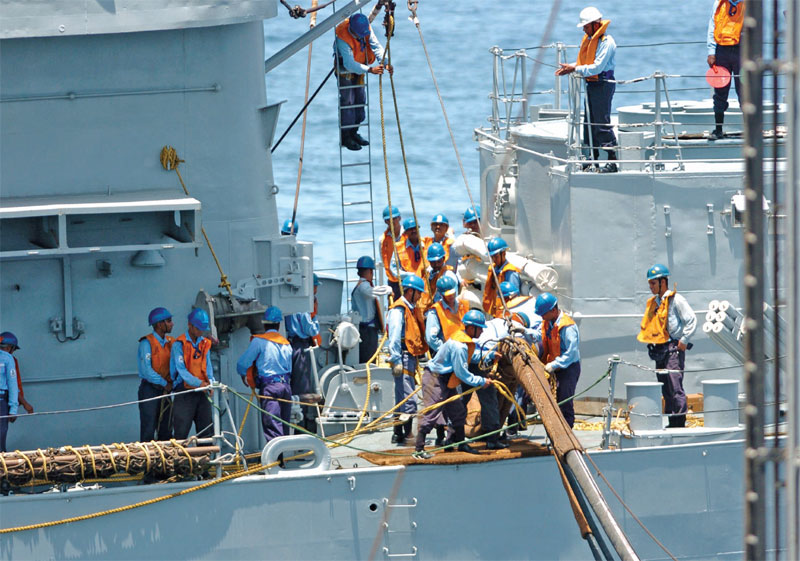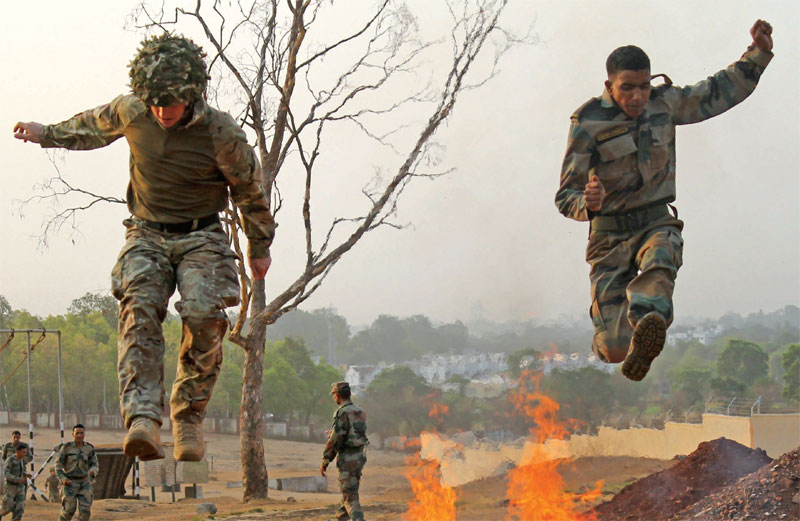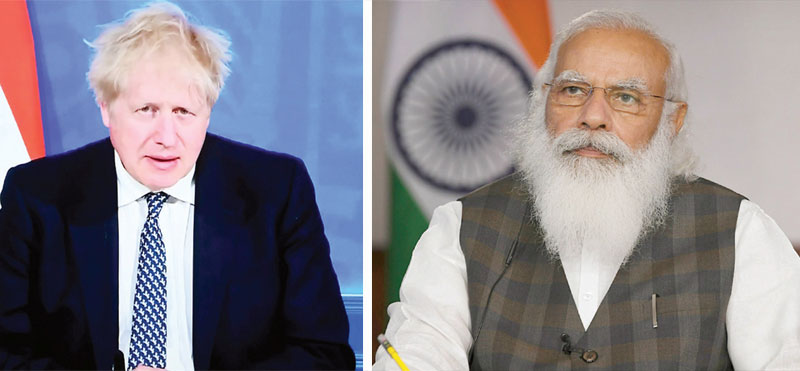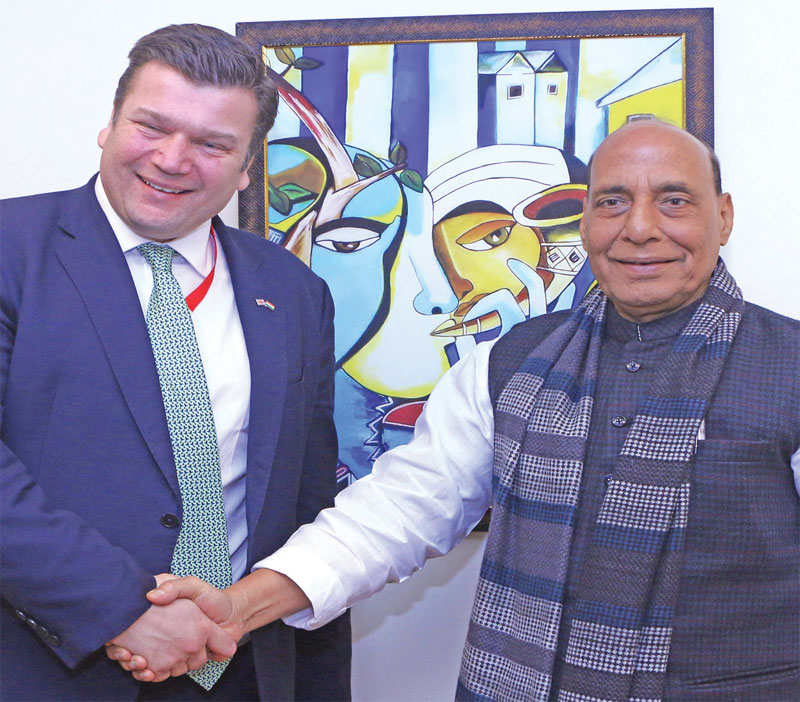The colonial past notwithstanding, India and the UK has forged common interests across domains
Smruti D
The Indo-Pacific, a recent geopolitical construct, is the centre of attention globally. Even though the expanse of the region is debated, roughly, it is understood to be an interconnected space between the Indian and the Pacific oceans. The region has gained significance because of the fierce US-China rivalry.

However, even without the competing interests of the present times, the region has always been immensely important for global trade; with some of the most powerful militaries of the world operating here. Countries around world are conscious of the threat that looms in the region. Thus, most countries have been working on fostering peace and stability in the region.
The United Kingdom’s tilt towards the Indo-Pacific is well-known and goes well past the current coinage. Post-colonialism, India has been a key factor in its geostrategic interest in the region. In furtherance of that, on 16 March 2021, the UK released the Integrated Review of Security, Defence, Development and Foreign Policy, which was followed by its Defence Command Paper on 22 March 2021. The Integrated Review, titled, ‘Global Britain in a Competitive Age’ highlights UK’s ‘Indo-Pacific tilt’, with China’s rising power and assertiveness being a cause for concern.
As the Indo-Pacific becomes an important region, the significance of India, being a regional power and its navy being a formidable force in the Indian Ocean Region (IOR), comes into the picture. India and UK share a modern relationship woven with diplomatic, trade and military ties. In India’s ministry of external affairs’ own words, “India and the United Kingdom share a modern partnership bound by strong historical ties.”
From the Past to the Present
British came to India in search of spices for the purpose of trade. The Britishers, with the aim of concentrating all resources in their hand, started to interfere in local politics in different provinces of India. The East India Company soon established trading posts all over the eastern and western coasts of India. In turn, Calcutta, Madras and Bombay became three major trading towns.
After the first Indian uprising of 1857, the Company was dissolved in 1858 and the British Crown took direct control of India. After the British left, and India ceased to be a colony, the two countries established bilateral relations at a number of levels, including trade, investments, defence, education and culture. In 2004, the bilateral ties were elevated to ‘Strategic Partnership’. Then Prime Ministers Dr Manmohan Singh and Tony Blair adopted a Joint Declaration titled ‘India-UK: Towards a New and Dynamic Partnership’ in London. This entailed annual summits and regular meetings between foreign ministers. The visit of Prime Minister David Cameron to India in July 2010 further elevated the relations to ‘Enhanced Partnership for the Future’.
Cut to May 2021, Prime Ministers Boris Johnson along with Narendra Modi elevated the ties to the level of Comprehensive Partnership while also announcing enhanced defence cooperation. The two prime ministers, in a virtual summit, unveiled a ‘2030 Roadmap’. The leaders reaffirmed the benefits of closer cooperation in a free and open Indo-Pacific, recognising their shared interest in regional prosperity and stability.
The two countries are also working to conclude a Logistics Memorandum of Understanding that will enhance the joint ability to tackle shared challenges. The roadmap includes commitments to expand UK-India health partnership to enhance global security and pandemic resilience; to tackle climate change, deepen economic relationship between the UK and India through an enhanced trade partnership while also aiming for a free trade agreement which would double the UK-India trade over the next decade.
The roadmap also paved a way for the UK universities to cooperate with their Indian counterparts in order to enhance crucial research in areas such as health, emerging technologies, and climate science. Global Innovation Partnership will co-invest in climate and health innovations from India to transform the lives of people across Africa, Asia and the Indian Ocean. It also includes extension of the UK-India Education and Research Initiative (UKIERI) to conclude its important work in bringing higher education and research sectors, and the people who work in them, closer. In November 2015, the British Council released a report that listed the opportunities India and the UK offer one another while suggesting that closer cultural and educational ties should be forged in order to ‘unlock that partnership.’
Looking at India’s rising stature, the council established a 2050 vision for India and the UK. The report stated, “The massive growth of India’s English-speaking middle classes offers a critical window of opportunity for the UK to become a partner of choice for trade, diplomacy, culture and education before India’s next generation turns its attention elsewhere. Much more could still be done to build on existing connections, including the large Indian-heritage diaspora in the UK.”
A BBC report from 2015 stated, “More than 21,000 students from India study in the UK and there has been an increase in Chevening and other scholarships for Indian students. New initiatives in science and education such as the Newton-Bhabha Fund and an increase in research collaboration from GBP one million to GBP 150 million all add to a strengthening of the relationship and growth in trade.”
After the UK’s exit from the EU, the country began making efforts towards building confidence among friendly countries with ‘Global Britain’ slogan. Given the closeness of Indo-US ties and the western shift towards the Indo-Pacific, UK has been vocal about India’s importance in the region. Prime Minister Boris Johnson would have been the second British leader after John Major in 1993, to participate in the Republic Day celebrations had the Covid-19 pandemic not struck.

However, at the time, accepting India’s invitation, Johnson had said, “As a key player in the Indo-Pacific region, India is an increasingly indispensable partner for the UK as we work to boost jobs and growth, confront shared threats to our security and protect our planet.” During the India-UK Joint Economic and Trade Committee (JETCO) in July 2020, the two countries announced that they would work to ‘establish a specific dialogue’ to explore ways in which tariff barriers could be removed, creating a ‘roadmap’ that ‘could’ lead to Free Trade Agreement.
The Indian High Commission in London had said, “India and the UK are committed to a Free Trade Agreement; Early Harvest Agreements for a start.” It further added, “Towards this, Working Groups to intensify efforts, meeting frequently; monthly meetings of MoS (ministers of state); commerce and industry minister (Goyal) and Secretary of State at the Department for International Development (Truss) to meet in Autumn 2020 in New Delhi.” While India-UK meetings have gained pace from last year, it is imperative to note that the two countries also cooperated in the area of vaccines. Covishield, as it is known in India and AstraZeneca, as it is known in the UK, is a product of Oxford University and India’s Serum Institute.
While it was developed in the UK, it was produced in India. Director, Studies and Head of the Strategic Studies Programme at Observer Research Foundation, Harsh Pant says, “India and the UK have had a historical relationship, but in the contemporary context, it had been struggling. After Brexit, as Britain looks for a new role for itself as part of its Global Britain initiative, and as India also looks at European countries, including the UK through a new lens, there is a new opportunity here to transform India-UK relationship, from one where historical issues dominated the discourse to one where contemporary 21st century issues, are the dominant frame of reference. I think that is where it is going. If you see the recent declaration by the Indian and British Prime Ministers, that’s what it intends to engage with each other more realistically, based on the contemporary set of scenarios that have been presented to them.”
He adds, “In this context, Indo-Pacific is very important because that’s where the convergence starts emerging. As Britain pivots towards the Indo-Pacific, India has become more welcoming towards the countries from the West and their role in the region, because India also faces the challenge of managing China’s rise and instability in the region. The West Asians are also rising and recognising the challenge that China poses to their value systems, interests and the larger regional stability. So, there is a pushback against China in the Indo-Pacific, and there is a recognition of the challenge that is coming from the region. Britain wants to play a role in that endeavour. So as Britain prepares itself for the role and move into this space, India is found to be a welcoming partner. The two countries are making efforts to resolve longstanding disputes such as migration and move forward with a more ambitious agenda.”
UK-India Trade and Investment Partnership
One of the reasons that pro-Brexit side had cited was that the UK would be able to forge better relations with the ‘most lucrative and fastest growing markets in the world,’ something that, according to them, the EU could not do. While speaking of the most lucrative markets, India seems to be of obvious interest to the UK.
Even as India has been struggling economically, it is considered to be one of the fastest emerging markets and is also predicted by PwC Research and Insights to be the second largest economy by 2050; second only to China. The global GDP ranking at Purchasing Power Parity (PPP) will also hold the second place, after China and ahead of the US. In February 2021, in the wake of Brexit, UK’s secretary of state for international trade and president of the board of trade, Elizabeth Truss said that deeper trade relations with India were an absolute priority. In 2019, India and the UK set up three new business-led working groups that would be run by the UK India Business Council (UKIBC) alongside CII and FICCI.
With India being high on London’s list of trade targets, a Free Trade Agreement (FTA) is crucial between the two countries. The negotiations for the agreement, which is yet to take place started in the early months of 2021. The deal is expected to generate additional employment in both countries, grow bilateral trade and unlock new opportunities in different sectors. It is aimed at lowering barriers, both tariff and non-tariff for businesses, especially at a time like this where prospects for global growth remain uncertain due to the pandemic.
A Scroll report stated, “The UK and India are the 5th and 6th biggest economies in the world. India is the largest single market, of about 1.4 billion people, that the UK has committed to negotiating a free-trade deal with India to date. India is Britain’s sixth-largest non-EU trading partner, whereas Britain is barely inside India’s top 20.” According to India Briefing’s report published in March 2021, “Both countries have made significant investment into each other’s economies, but there is space for further growth.” It further added that the data released by the UK government’s Department for International Trade (DIT) in 2019 stated that India was the second largest investor in the UK, having invested in 120 projects and creating close to 5,429 jobs.
In its ‘Britain Meets India’ Report, consultancy Grant Thornton Bharat, in collaboration with the DIT and the CII, stated that the UK was India’s sixth largest investor, having invested a total of USD29.56 billion during April 2000 to September 2020. This is about six per cent of all foreign direct investment (FDI) received by India. The FDI inflow from the UK to India increased from USD898 million in 2015-16 to USD1.42 billion in 2019-20.
In fact, according to Grant Thornton Bharat, 572 UK companies in India, with a combined turnover of INR 3.39 trillion (USD46.73 billion), employed 416,121 people directly.” Many UK companies have set up facilities in Maharashtra due to the Memorandum of Understanding (MoU) signed between the UK India Business Council and the Maharashtra Industrial Development Corporation (MIDC) on 3 July 2020. At the G7 virtual meet, the two Prime Ministers announced investment deals worth GBP one billion. This includes GBP 533 million worth of investments from India to UK. In total, investment of GBP one billion will mean generation of 6,000 jobs.

Global Support
The UK has several times, expressed support to India’s endeavour for the permanent membership of the UNSC. It is also an important interlocutor for India in the EU, G8, G20 and other global forums. This year, in June, during the G7 meet, UK Prime Minister Johnson who was the host of the G-7 meet, invited India, South Korea and Australia to attend the leaders’ summit in Cornwall.
Though it is a usual practice at G7 to invite guest countries, their involvement is generally limited. However, reports suggest that this year, the guests’ involvement carried more weight than usual.
Yet, ironically, UK has not always sided with India at the UN. In 2010, when India became a non-permanent member for the first time after the 9/11 attacks and terrorism had come under global scanner, India wanted to chair at least one Counter Terrorism Committee (CTC). Being one of the five permanent members, the UK opposed India’s move. Critics say that Britain blatantly sided with Pakistan in this matter.
In 2019, after India abrogated Article 370 and Article 35A, and India ‘succeeded in blocking attempts by Pakistan and China to bring the issue of J&K back on the formal agenda of the UN’, the UK and Russia assumed a position that did not favour India’s decision. While the two countries, on the one hand, echoed that it was India’s internal matter, the UK expressed concern over human rights situation in the J&K and also extended support to China’s demand for the UNSC to issue a public statement on India’s recent moves to strip the state of its special status.
Later, clearing its position, the UK stated that it did not side with Pakistan. The Times of India reported a British diplomat as saying, “I can confirm we did not take sides in the debate and did not side with China against India. Our longstanding position is that it is for India and Pakistan to find a lasting political solution on Kashmir.”
In different news, India had voted in favour of a UN resolution that demanded the withdrawal of the UK from the Chagos islands in the British Indian Ocean territory.

India-UK Military Ties
India and the UK share historical and regimental military links. The two armies even have a similar ethos. The joint army-to-army biennial exercise Ajeya Warrior was started in 2005 with the battalion-level strength. The latest exercise culminated in 2020 February at West down Camp, Salisbury Plains Training Area, UK. Likewise, the naval exercise, Konkan, first held in 2004, is scheduled for July this year in the Bay of Bengal. The air forces of both the countries conduct the Indradhanush exercise that were first held in 2006. This exercise was last held in February 2020, at Air Force Station, Hindan at Ghaziabad.
The UK’s Carrier Strike Group will sail to India, led by HMS Queen Elizabeth for the naval exercise, travelling over 26,000 nautical miles from the Mediterranean to the Red Sea, from the Gulf of Aden to the Arabian Sea, and from the Indian Ocean to the Philippine Sea. Throughout the deployment, the UK will support freedom of passage through vital global trading routes and demonstrate commitment to a recognised international system of norms and behaviours that benefit all countries. It will also help to establish a maritime partnership with India to support mutual security objectives in the Indian Ocean. The 10-year roadmap said India and the UK will work in a strategic partnership to strengthen efforts to tackle cyber, space, crime and terrorist threats and develop a free, open and secure Indo-Pacific region.
Recently, India’s Hindustan Aeronautics Limited (HAL) and Rolls Royce announced their decision to move aspects of the manufacture of the MT30 Gas Turbine engine to India, supporting PM Modi’s Make in India initiative. The MT30 is an engine employed widely in navies around the world and is the basis of the UK’s Integrated Electric Propulsion system that powers the Queen Elizabeth class carrier. This MoU will help in establishing packaging, installation, marketing and services support for Rolls-Royce MT30 marine engines in India. Through this MoU, Rolls-Royce and HAL will expand their long-standing partnership in India and work together in the area of marine applications for the first time. Earlier this year at the Aero India 2021 show, the two companies also announced a new partnership in the aerospace sector.
As part of a ‘2030 Roadmap’, they agreed to work closely together in support of India’s indigenous development of the Light Combat Aircraft Mark 2. They also spoke of the potential for further industrial collaboration in areas like maritime propulsion, space and cyber, marking the start of a promising new era of UK-India research, capability and industrial collaboration on India’s defence industrial programmes.
For Indians, the UK remains a preferred destination for higher studies. Data shows that even during the pandemic, the UK remained one of the top destinations for Indian students desiring to go abroad. The Indian community in the UK makes-up for the large Diaspora. In fact, a newspaper report from 2015 states that Indians have now become UK’s biggest overseas born population. The report stated that the number of Indians have grown by half since 2004 with 7.6 lakh of them living in the UK. As people to people ties grow, the UK is considered to be a natural ally of India.

